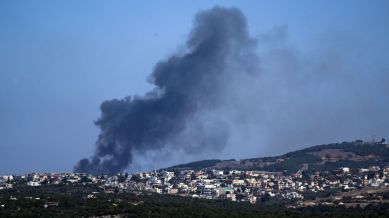Stay updated with the latest - Click here to follow us on Instagram
Hezbollah signals willingness for ceasefire as Israeli strikes intensify in Lebanon
In a televised speech, Hezbollah's deputy leader, Naim Qassem, expressed support for efforts to broker a truce, notably omitting the end of the Gaza war as a condition for halting the conflict on the Lebanon-Israel border.

Iran-backed Hezbollah, which has endured significant losses from Israeli forces in Lebanon, hinted on Tuesday that it may be open to a ceasefire after Israel intensified its operations with fresh incursions in the south of the country.
In a televised speech, Hezbollah’s deputy leader, Naim Qassem, expressed support for efforts to broker a truce, notably omitting the end of the Gaza war as a condition for halting the conflict on the Lebanon-Israel border. Qassem backed the ceasefire efforts led by Speaker of Parliament Nabih Berri, a Hezbollah ally, who has been pushing for an end to the fighting that has escalated in recent weeks with Israeli ground operations and the killing of senior Hezbollah leaders.
monthly limit of free stories.
with an Express account.
“We support the political efforts being led by Berri under the title of a ceasefire,” Qassem said during his 30-minute speech, Reuters reported.
It was unclear whether this marked a shift in Hezbollah’s stance, as the group had previously vowed to fight in solidarity with the Palestinians in Gaza and insisted that it would not cease hostilities without a ceasefire there.
Speaking from an undisclosed location, Qassem described the ongoing conflict with Israel as a battle of endurance, asserting that Hezbollah’s strength remains intact despite suffering what he termed “painful blows” from Israel. “We are striking them. We are hurting them, and we will prolong the time. Dozens of cities are within the reach of our resistance’s missiles. Our capabilities remain strong,” Qassem was quoted as saying by Reuters.
His comments come just days after Hezbollah’s leader, Sayyed Hassan Nasrallah, was killed in an Israeli strike – the most significant blow Israel has dealt to Hezbollah in decades. Hashem Safieddine, seen as a potential successor to Nasrallah, has not been heard from since an Israeli airstrike last week. Israel continued its pressure on Hezbollah, killing another senior figure on Tuesday while launching more operations in southern Lebanon.
Qassem claimed that Israeli ground forces had not made significant progress in their southern Lebanon incursions, which began a week ago. “Once the ceasefire takes shape, and diplomatic efforts succeed, all other details will be discussed,” he added. However, he also warned that if Israel continued its aggression, “the battlefield will decide” the outcome.
The escalation between Hezbollah and Israel follows the broader regional tensions triggered a year ago when Hamas launched an attack on southern Israel. Recent weeks have seen these tensions expand, with Israel launching multiple air and ground operations against Hezbollah in Lebanon. On 1st October, Iran, which supports both Hezbollah and Hamas, fired missiles at Israel.
Warning from Iran
Iran issued a warning to Israel on Tuesday, threatening retaliation if its infrastructure were attacked. Iranian Foreign Minister Abbas Araqchi stated that any such strike would be met with a strong response. Araqchi is scheduled to visit Saudi Arabia and other Middle Eastern countries, aiming to discuss “the Zionist regime’s shameless crimes in Lebanon and Gaza.”
According to sources, Gulf Arab states have reassured Tehran of their neutrality in the Israel-Lebanon conflict.
On the ground in Lebanon, Israeli operations have expanded. The Israeli military reported carrying out “limited, localised, targeted operations” in the southwest, in addition to those previously conducted in the southeast. The World Food Programme expressed concern over Lebanon’s food supply, as thousands of hectares of farmland in the country’s south have been burned or abandoned due to the conflict. WFP official Matthew Hollingworth warned that Lebanon might struggle to feed itself, with crops rotting in fields.
The World Health Organisation also raised concerns about disease outbreaks among Lebanon’s displaced populations.
Israel continued airstrikes on southern Beirut overnight, claiming to have killed Suhail Hussein Husseini, a Hezbollah figure responsible for the group’s finances and logistics. This follows a series of targeted assassinations by Israel of Hezbollah and Hamas leaders.
(With inputs from Reuters)